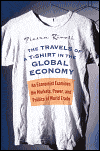Book Review: Travels of a T-Shirt ….
Rivoli, Pietra. Travels of a T-Shirt in the Global Economy: An economist examines the markets, power and politics of world trade. Wiley, 2005
In 1979, when I worked at Ohio State, Honda built a factory in Marysville, Ohio. The economy in the Midwest was in shambles following the Arab oil embargo of the 70’s. Employment climbed to 10% and inflation was 12%. The mortgage on our first home was 13%, which looked like a bargain after rates climbed to 16%. Everyone we knew in Ohio tried to “buy American,” but after the Honda factory opened in Marysville, using unemployed (non-union) autoworkers, we began to wonder what it meant to buy American.
Twenty years later in 1999, an economist from Georgetown University’s school of business, watched a crowd of students on campus protest the evils of globalization — capitalism, corporations, the IMF and the WTO. A young woman grabbed the microphone and shouted to the crowd, “Who made your T-shirt?” Was it a child in India living in poverty for Nike’s profit? The economist began to wonder what it meant to be global, but unlike me a generation earlier, she traveled the world to investigate. Six years later, she published a book about the people, politics and markets that created her cotton T-shirt.
This is the story of globalization — the story of real people on three continents, woven together with economic and political lessons, that addresses the sometimes surprising winners and losers in the global economy. Using a simple product, the story shows that free markets aren’t always free, that victims are sometimes beneficiaries, and that nothing about globalization is simple. This book is both a good read and informative text, as well as a key resource for Fuqua’s Global Institute, August 2007.
© Reviewer: Meg Trauner & Ford Library – Fuqua School of Business. All rights reserved.
Tags: Economics, Globalization

October 13th, 2009 at 10:36 am
Interesting post, thank you. It’s interesting how many people take a thing like a tshirt for granted, oblivious to what might have gone into creating that shirt.
March 3rd, 2010 at 7:05 pm
“Who made your T-shirt?” Was it a child in India living in poverty for Nike’s profit? Wow, the things we take for granted. Cause and effect every where we look.